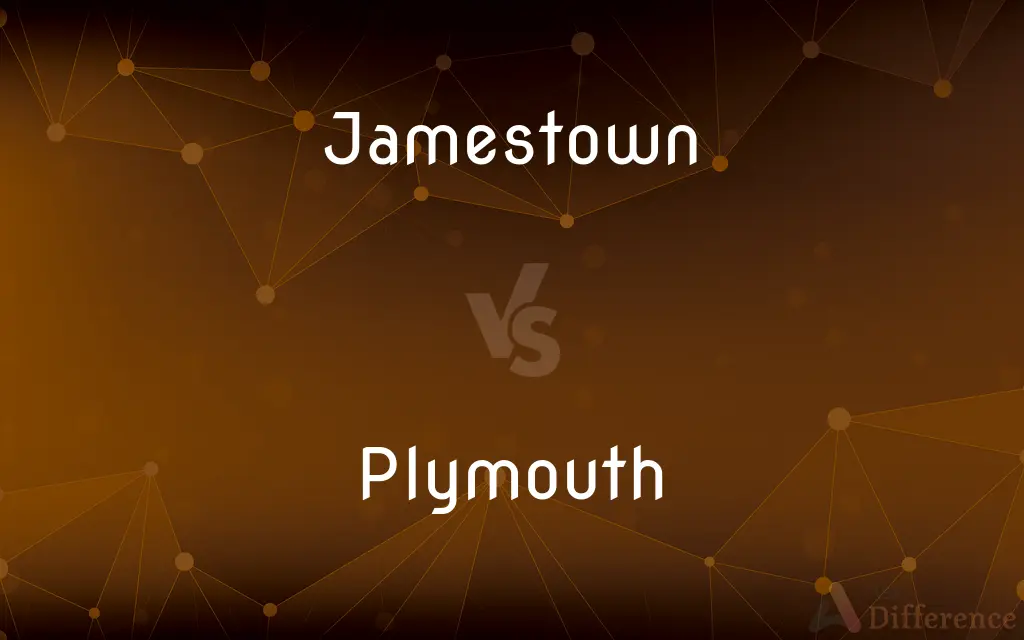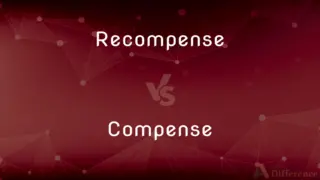Jamestown vs. Plymouth — What's the Difference?
By Tayyaba Rehman — Updated on September 22, 2023
Jamestown is first permanent English settlement in the Americas (1607), Virginia. Plymouth is settled by the Pilgrims in 1620, Massachusetts. Jamestown was primarily economic, while Plymouth sought religious freedom.

Difference Between Jamestown and Plymouth
Table of Contents
ADVERTISEMENT
Key Differences
Jamestown, located in present-day Virginia, was founded in 1607 by the Virginia Company of London. It became the first permanent English settlement in the Americas. Its establishment marked the beginning of the English colonial era in North America. Conversely, Plymouth, situated in present-day Massachusetts, was established in 1620 by the Pilgrims, English separatists seeking religious freedom.
While Jamestown was founded with economic aspirations, attracting adventurers and entrepreneurs, Plymouth's settlers primarily sought a haven from religious persecution. These Pilgrims, who crossed the Atlantic aboard the Mayflower, envisioned a community grounded in their religious beliefs, far from the Anglican Church's influence.
Jamestown faced extreme hardships, with settlers unprepared for the challenges of the New World. Early years saw famine, disease, and conflicts with native tribes. On the other hand, Plymouth settlers also faced severe trials but benefited from friendly Native American relations, especially with the Wampanoag tribe, ensuring their survival.
Though both settlements struggled initially, they laid foundational bricks for future English colonies. Over time, Jamestown grew as a tobacco-producing colony, while Plymouth set a precedent for self-governance with the Mayflower Compact.
Comparison Chart
Location
Virginia
Massachusetts
ADVERTISEMENT
Year of Establishment
1607
1620
Founders
Virginia Company of London
Pilgrims
Primary Objective
Economic ventures
Religious freedom
Notable Developments
Tobacco cultivation
Mayflower Compact (early form of self-governance)
Compare with Definitions
Jamestown
First English settlement in the Americas.
Jamestown, established in 1607, marked the beginning of English colonization in North America.
Plymouth
Founded for religious freedom and separation.
Plymouth became a haven for those escaping religious persecution in England.
Jamestown
Known for its tobacco cultivation.
The prosperity of Jamestown eventually hinged on the lucrative tobacco trade.
Plymouth
Home to the historic Mayflower Compact.
The Mayflower Compact, signed in Plymouth, was a pioneering document for self-governance.
Jamestown
A settlement faced with early adversities.
Famine, disease, and conflicts challenged Jamestown's initial years.
Plymouth
A Massachusetts settlement by the Pilgrims.
In 1620, the Pilgrims aboard the Mayflower established Plymouth.
Jamestown
A colony in Virginia founded for economic pursuits.
The settlers of Jamestown hoped to find gold and establish profitable trade routes.
Plymouth
Known for its early alliance with Native Americans.
Plymouth settlers formed crucial bonds with the Wampanoag tribe for survival.
Jamestown
A historic site reflecting early colonial life.
Visitors can explore reconstructed buildings and artifacts at Jamestown to understand colonial history.
Plymouth
Represents Pilgrim history and heritage.
Plymouth Rock is a symbol of the Pilgrims' first steps in the New World.
Jamestown
A former village on the James River in Virginia north of Norfolk; site of the first permanent English settlement in America in 1607
Plymouth
Plymouth ( (listen)) is a port city and unitary authority in South West England. It is located on the south coast of Devon, approximately 37 miles (60 km) south-west of Exeter and 190 miles (310 km) south-west of London.
Plymouth
A town in Massachusetts founded by Pilgrims in 1620
Common Curiosities
What crop became prominent in Jamestown?
Tobacco became a significant and profitable crop in Jamestown.
Where is Jamestown located?
Jamestown is located in present-day Virginia.
Who were the main settlers of Plymouth?
Plymouth was primarily settled by the Pilgrims, English separatists seeking religious freedom.
How did Plymouth settlers interact with Native Americans?
Plymouth settlers, especially with the Wampanoag tribe, forged friendly relations, ensuring their survival.
How did religion play a role in Plymouth's establishment?
Plymouth was established by Pilgrims seeking a place to practice their religion freely and without persecution.
What was the Mayflower Compact in Plymouth?
The Mayflower Compact was an early agreement for self-governance signed by the Plymouth settlers.
Which settlement came first, Jamestown or Plymouth?
Jamestown was established in 1607, thirteen years before Plymouth in 1620.
What challenges did Jamestown settlers face?
Jamestown settlers grappled with famine, disease, and conflicts with native tribes.
Was Plymouth the first English settlement in North America?
No, Jamestown was the first permanent English settlement, established 13 years before Plymouth.
Why is Plymouth Rock significant?
Plymouth Rock is believed to be the landing site of the Mayflower and symbolizes the Pilgrims' arrival.
What were the primary goals of Jamestown settlers?
Jamestown settlers aimed for economic gains, hoping for gold and establishing trade routes.
How did Jamestown influence future colonies?
Jamestown's experiences, especially in agriculture and trade, influenced the establishment and growth of subsequent English colonies.
Who funded the Jamestown expedition?
The Virginia Company of London funded the Jamestown expedition.
How has Jamestown contributed to American history?
Jamestown, as the first permanent English settlement, laid the groundwork for English colonization and influences in America.
Are there historical sites to visit in both Jamestown and Plymouth today?
Yes, both Jamestown and Plymouth have preserved sites where visitors can learn about early colonial history.
Share Your Discovery

Previous Comparison
Recompense vs. Compense
Next Comparison
SSH vs. SCPAuthor Spotlight
Written by
Tayyaba RehmanTayyaba Rehman is a distinguished writer, currently serving as a primary contributor to askdifference.com. As a researcher in semantics and etymology, Tayyaba's passion for the complexity of languages and their distinctions has found a perfect home on the platform. Tayyaba delves into the intricacies of language, distinguishing between commonly confused words and phrases, thereby providing clarity for readers worldwide.















































